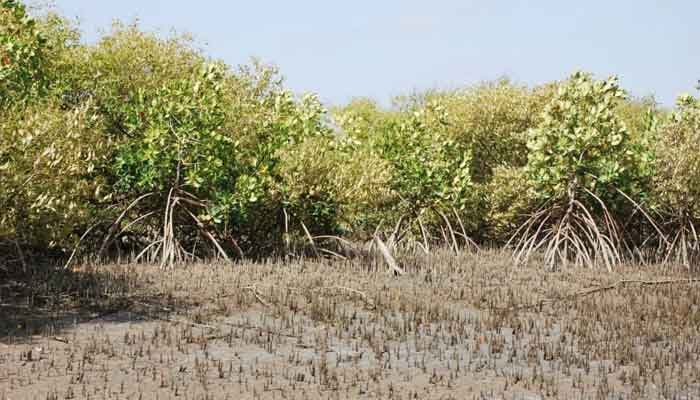
The University of Karachi (UoK)-associated research centre has completed Pakistan’s first genome sequencing of a mangrove species, marking a milestone in environmental and genetic research.
A seminar was conducted at the KU’s KIBGE’s Jinnah Auditorium on Wednesday to share the results of a breakthrough in plant genomics and climate resilience research for the completion of Pakistan's first mangrove Genome Avicenna marina.
This breakthrough in plant genomics and climate resilience research was mutually conducted by Professor Dr Kamran Azim from KU’s Department of Biochemistry, Dr Waqar Ahmed from KU’s Institute of Environmental Studies, and Dr Afsheen Arif from KU’s Dr A Q Khan Institute of Biotechnology and Genetic Engineering.
With this completion, the purpose was to unlock insights into salt tolerance and climate adaptation, and advance conservation strategies for the fragile coastal ecosystem.
During his presentation, Dr Waqar Ahmed said: “Mangroves are woody shrubs and tropical plants that grow well in the intertidal zones of tropical to sub-tropical latitudes. Globally, mangrove covers about 200,000 km2 and belongs to the family Acanthaceae that comprises more than 400 species of a polyphyletic group of trees.”
These trees have unique Physio-morphological adaptations and tolerance against a hypersaline environment, tidal cycles, and soil chemistry.
He said that grey mangroves have been divided into categories based on their habitat and importance to the community structure.
According to Arif, the previous studies on this topic were from the UAE, India, and China in the years 2021, 2023 and 2024. A new mangrove database has also been established by China. This particular study managed 44,605 predicted protein-coding genomes.
She said that salinome, the set of genes for salt-tolerant mechanisms, can further help the researchers with climate mitigation.
Arif shared that biotechnology applications of the mangrove genome include the use of its genes and connected microbes to develop new products and solve environmental problems.
Mangrove genomes can also be used to engineer other plants for traits like salt tolerance.
Meanwhile, a speaker, Professor Dr Kamran Azim, briefed on the findings of this genome by the quality of DNA, library preparation, sequencing technology, estimation of scaffolding, completeness, and number of genes by functions. He mentioned that this genome sequence will be a milestone for upcoming research in the mangrove field in Pakistan.
Various plants and some animals were studied through genome sequencing to increase their export to other countries. Professor Dr Kaman Azim deep dives into the DNA extraction, methodology, quality and quantity.
At the end of the seminar, the KU Vice Chancellor Professor Dr Khalid Mahmood Iraqi applauded the researchers’ team and their work and also emphasised that university teachers should work in collaboration to produce quality research.
















